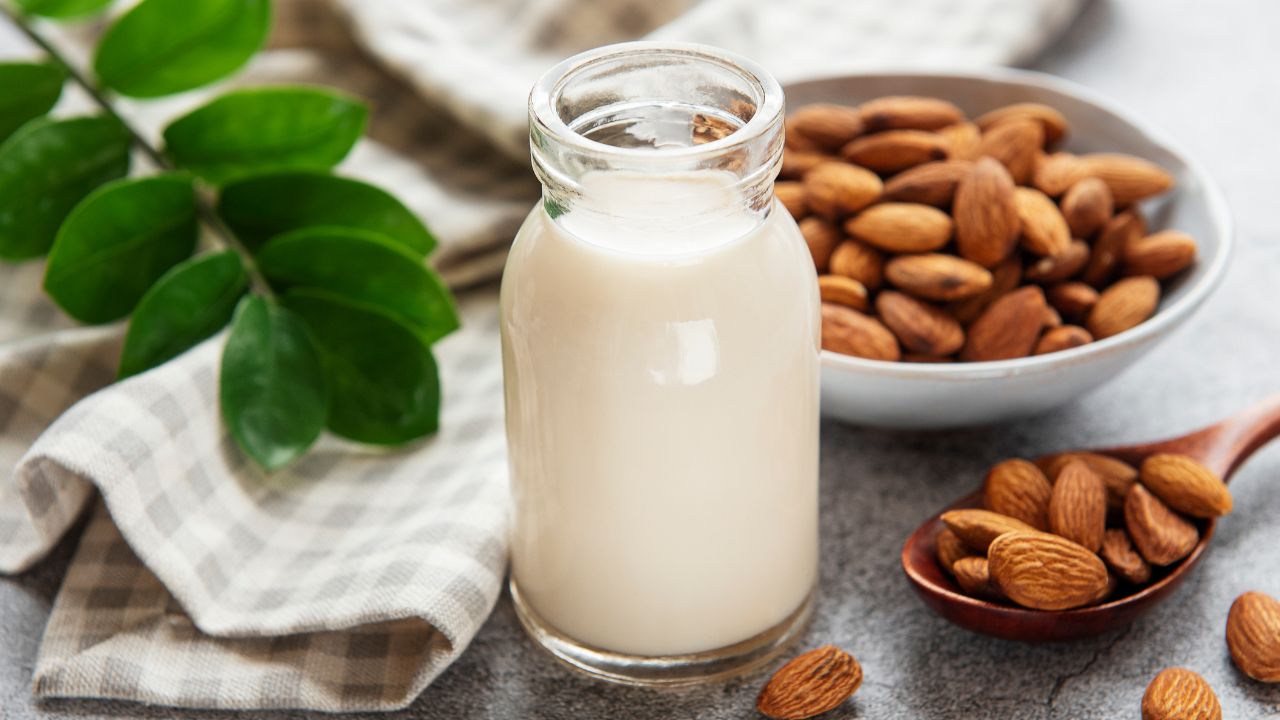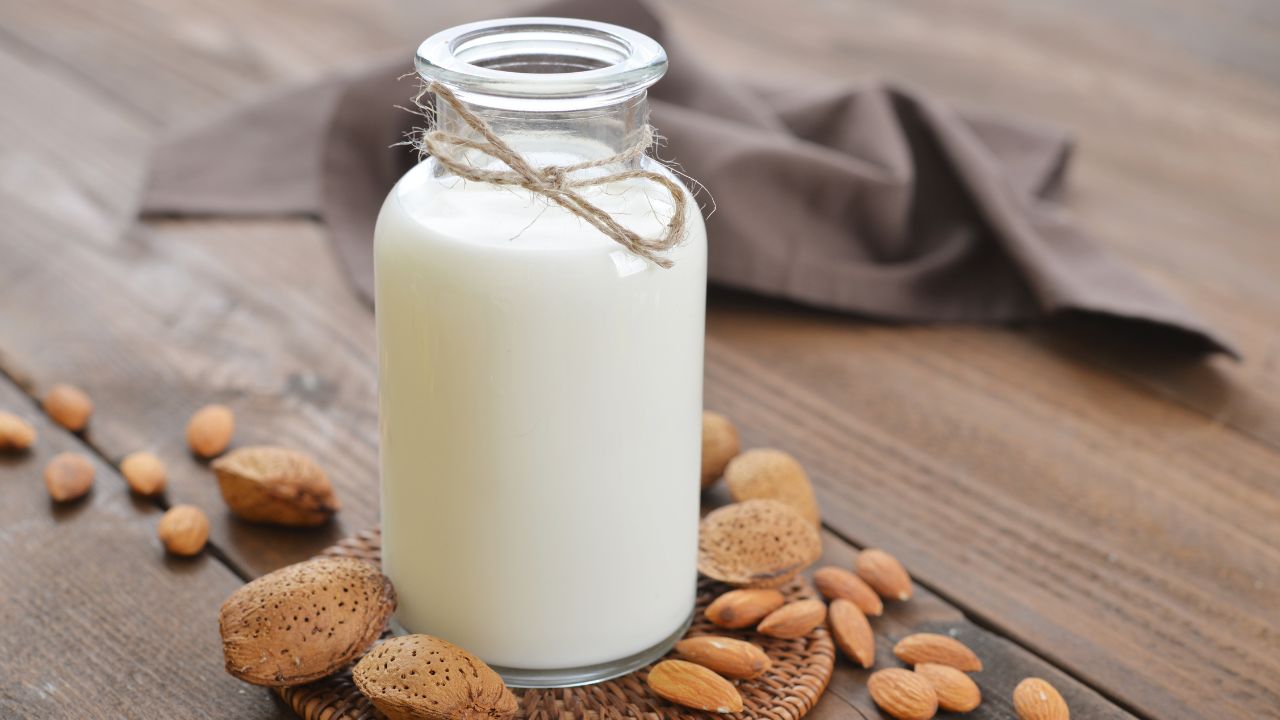Almond milk spoils, and this applies to all varieties, including shelf-stable, refrigerated, and homemade. The expiry date and appropriate storage are two important considerations.
To find out more about almond milk including how it is made, storing it properly, the signs that it has expired and more, then keep reading.

What Is Almond Milk Exactly?
Almond milk is made from almonds and is one of the many varieties of plant milk, it has a nutty flavor and watery texture, while certain brands or varieties are flavored to resemble cow’s milk.
It has no cholesterol or lactose and has a low saturated fat content.
Almond milk is popular among lactose intolerant people and those who avoid dairy products, like those who are vegans.
Commercial almond milk is available in sweetened, unsweetened, vanilla, and chocolate tastes and is often supplemented with vitamins. It is also possible to make it at home with a blender, water, and almonds.
How Is Almond Milk Made?
The water is then drained, and the almonds are combined with salt, fresh water, and any additional ingredients in a blender such as vanilla or dates for sweetness, berries, and cacao powder.
After blending for one to two minutes, the milk is moved into a mixing bowl via a nut milk bag. And then pressed to get all of the liquid.
Benefits Of Almond Milk
Even though it is not as rich in nutrients as cow’s milk, there are still plenty of health benefits that come with drinking almond milk.
Rich In Vitamin E
Almonds are a great source of vitamin E, a fat-soluble vitamin that helps protect your cells from free radical damage.
Vitamin E enhances eye and skin health and may help prevent illnesses such as heart disease.
One cup of commercial almond milk contains 110% of the percent daily value for vitamin E, making it a simple and inexpensive way to meet your daily requirements.
Unsweetened Variety Is Low In Sugar
The majority of Americans consume much too much added sugar in the form of sweets, beverages, and sweeteners.
Choosing naturally low-sugar foods and beverages can thus help you control your weight and reduce your risk of certain chronic illnesses.
Many plant-based milks are sweetened and flavored. In fact, one cup of chocolate-flavored almond milk can contain up to 21 grams of added sugar – the equivalent of more than five teaspoons.
Unsweetened almond milk is naturally low in sugar and high in vitamin E, a powerful antioxidant that fights illness. Sweetened almond milk, on the other hand, can be high in sugar.
How Long Does Almond Milk Last?
The shelf life of almond milk varies depending on the variety and how carefully it is stored.
Fresh almond milk from a local source or homemade almond milk does not include any preservatives, so even if carefully stored in the refrigerator, it will only survive approximately five days.
Ultra-pasteurization is a heating and chilling procedure that eliminates microorganisms and increases shelf life in store-bought chilled almond milk. When properly stored in the refrigerator, it should last up to seven days once opened.
The longest shelf life is seen in shelf-stable almond milk. It will normally last about two months unopened and up to ten days once opened and chilled if properly kept.
Remember that these are simply suggestions, as the shelf life of almond milk varies depending on the brand and how properly it is stored.
While these time periods are important to remember, the ultimate test is how the almond milk smells, looks, and tastes.
How To Know When Your Almond Milk Has Expired

First, the signs of expired almond milk depend on whether the almond milk is fresh or professionally produced.
If you made your own almond milk, you only have about four to seven days before it will start to clump together and smell weird. When it gets to this point, you will be able to tell.
Almond milk that is sold in stores is often ultra-pasteurized. That indicates it was fast heated to 280°F and then cooled straight away – this method enhances shelf life.
If it is a refrigerated carton, it’s normally suggested that you drink it within seven days after opening it.
For a shelf-stable almond milk, you can store it at room temperature until opened, and you will have about seven to ten days to drink it after it’s opened as long as the open container is kept in the fridge.
This timescale is only a recommendation; the milk may still be safe to consume after those days have gone.
The genuine litmus test is how the milk appears and tastes: Toss it when it becomes thick, clumps somewhat, smells odd, and tastes foul.
Is It Dangerous To Drink Expired Almond Milk?
Bacteria, much as in spoilt milk, are to blame for the foul taste of almond milk. If you consume outdated almond milk, you will consume a high quantity of harmful microorganisms.
This might result in stomach pain, diarrhea, and vomiting. Extremely rancid almond milk might result in serious food illness.
If you discover that your almond milk has gone bad too late, the most essential thing you can do is keep hydrated. You will become dehydrated if you vomit or have diarrhea.
Drinking Pedialyte or sports drinks might assist your kidneys in cleansing your system.
While rancid dairy milk is more likely to cause food poisoning, poor almond milk can also lead to you feeling very ill. If you are struggling with keeping liquids down, you should go to the hospital to get hydrated while you recover.
How To Properly Store Almond Milk
The best way to preserve unopened almond milk varies depending on the type of almond milk and where it was purchased. If you’re lucky enough to have a local purveyor that makes fresh almond milk, keep it in the fridge.
The same is true for any refrigerated almond milk you purchase.
Shelf-stable almond milk, which comes in unrefrigerated rectangular cartons, may be stored in your pantry or any cold, dark spot away from heat and light.
Simply recall where you got the almond milk to help you remember. If the almond milk was in a fridge when you got it, you should store it in the fridge; but if it wasn’t, keep it in the pantry.
Always refrigerate almond milk after it has been opened, even homemade almond milk.
If at all possible, keep almond milk in the back of the fridge, where the temperature is the lowest and most stable. Keep it away from the door, where the temperature might change.
Almond Milk Substitutes
Cashew milk is a great almond milk replacement. In terms of consistency and general flavor, it is significantly closer to conventional cow’s milk.
It also has a creamier texture than other forms of non-dairy milk, which may make it simpler for typical dairy consumers to switch to.
Coconut milk is a fantastic substitute for almond milk. Coconut milk is a creamy, higher-fat substitute that offers many of the same advantages as conventional milk.
It is substantially thicker than almond milk and is created from the flesh of the coconut. It has a naturally sweet flavor that may be used to enrich everything from your morning coffee to your supper sauce.
Finally, soy milk is another common plant-based milk substitute that works well in place of almond milk, it is a great option if you’re trying to avoid nuts.
It is prepared from soybeans and is usually enriched with vitamins and omega-3 fatty acids to provide a nutritious, non-dairy alternative.
Final Thoughts
If you happen to drink expired almond milk, you will get food poisoning just like any other milk.
Although it has less germs than dairy milk, bacterial spores can still develop if the almond milk container is not stored properly. Because of this, you should store almond milk in the refrigerator and always check the expiry date before drinking it.
- 15 Traditional Greek Breads - July 31, 2023
- 30 Delicious And Gluten-Free Cookie Recipes - July 29, 2023
- 30 Of The Best European Desserts - July 29, 2023
